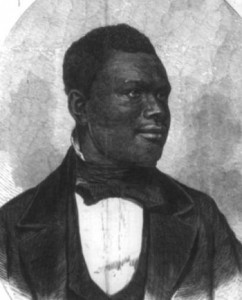U.S. President Abraham Lincoln continues his gradual but relentless public push for emancipation, today asking the border states to embrace compensated emancipation.
Gentlemen. After the adjournment of Congress, now very near, I shall have no opportunity of seeing you for several months. Believing that you of the border-states hold more power for good than any other equal number of members, I feel it a duty which I can not justifiably waive, to make this appeal to you. I intend no reproach or complaint when I assure you that in my opinion, if you all had voted for the resolution in the gradual emancipation message of last March, the war would now be substantially ended. And the plan therein proposed is yet one of the most potent, and swift means of ending it. Let the states which are in rebellion see, definitely and certainly, that, in no event, will the states you represent ever join their proposed Confederacy, and they can not, much longer maintain the contest. But you can not divest them of their hope to ultimately have you with them so long as you show a determination to perpetuate the institution within your own states. Beat them at elections, as you have overwhelmingly done, and, nothing daunted, they still claim you as their own. You and I know what the lever of their power is. Break that lever before their faces, and they can shake you no more forever….
I do not speak of emancipation at once, but of a decision at once to emancipate gradually. Room in South America for colonization, can be obtained cheaply, and in abundance; and when numbers shall be large enough to be company and encouragement for one another, the freed people will not be so reluctant to go….
Despite the alliance of the border states with the Union, they refuse Lincoln’s offer, further building a case for the unconditional emancipation that Lincoln most desires. For now, Lincoln’s continued courting of the border states within the context of a sensitivity to the volatile issue of the economics of slavery assures that the Confederacy will not expand beyond the breakaway nation’s current eleven states.
Anthony Burns, a former slave, longtime African Baptist preacher, and freeman, will not live to see the emancipation of his people. Ill from tuberculosis, Burns–whose 1853 escape from slavery in Richmond and subsequent capture in Boston had commanded the attention of U.S. President Franklin Pierce and galvanized Northern sentiment against the Fugitive Slave Act –dies on July 17 at the young age of 28, but not before leaving a legacy as a Baptist and an advocate of freedom.
Sources: “The President to the Congressional Representatives From the Border States,” July 12, 1862 (link); Charles E. Stevens, Anthony Burns: A History, Boston: John B. Jewett, 1856 (link); Karen Livingood, “The Anthony Burns Affair” (link); Fugitive Slave Act (link); African Colonization and Abraham Lincoln (link); image of Anthony Burns (link)



